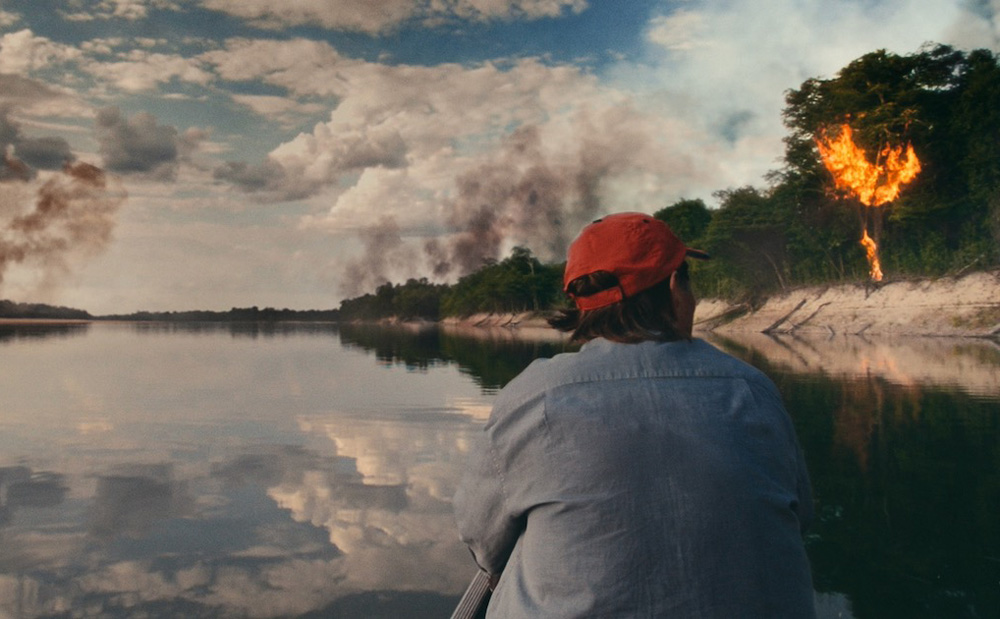“The Outpost” begins, as many portraits of environmental activists do, with a dream. Out in the small village of Xixuau in the Amazon Rainforest, Christopher Clark can imagine an epic concert where if all goes according to plan, David Gilmour of Pink Floyd will appear as though he’s jamming out on the water on the riverbank, his feet not touching the land if viewed from the right vantage point. Clark has Gilmour’s e-mail address, and dares to think that the cause of saving the Xixuau territory in Brazil is enough of a lure for not only the famed guitarist, but to possibly take the stage with his former bandmate Roger Waters in spite of the fact the two have been bitterly feuding for the better part of a decade when surely the two could see eye to eye on ensuring protection of the region with the proceeds from such a reunion.
It doesn’t seem unreasonable, given how vividly Clark envisions it or the fact he’s helped keep the Xixuau safe from deforestation for the past 25 years, but director Edoardo Morabito also doesn’t discourage skepticism about the viability of Clark’s plans, playfully undercutting the series of breathtaking overhead shots of nature’s majesty that you might expect in a film like this accompanying Clark’s thoughts of grandeur with an unusually personal and wry voiceover that you wouldn’t usually, openly wondering if he commits to the project “If Chris would be upset by my [relative] mediocrity?”
Morabito turns out to be more than up to the task of telling Clark’s story, warts and all, in “The Outpost,” which refreshingly takes off the rose-tinted glasses typically associated with tales of activism that makes one both the tenacity required to take up noble endeavors all the more when it concedes that those that do shouldn’t always be seen as heroic. From the start, Clark can be seen with a duality about him, his John Denver haircut just long enough to look cool when the breeze catches it as he rides boats out on the Amazon, but appearing like he’s from the backwoods on land, unglamorously making mojitos for himself by muddling limes and mint with the bottom of a white rum bottle in a steel pot before pouring nearly the entire bottle in. He confides in Morabito that “I’d go crazy living in a community” when he’s loathe to interact with others and deal with gossip. Yet he’s dedicated his life to building one in Xixuau in order to save its soil, coming up with a brilliant plan decades ago for a self-sustaining society made up of caboclos, the nation’s most marginalized community of mixed descent whom he promises a place to live in exchange for being its stewards.
Ideally, there would be no need for money in Xixuau, with deals Clark made for solar energy with European benefactors eliminating the need among locals to go into logging or poaching to keep a roof over their head, and when more income is needed, the town can turn to tourism to keep its residents afloat. However, the changes at the top of Brazil’s government with the election of Jair Bolsonaro create an existential threat for the Xixuau, which is seen as primed for redevelopment and Clark is feeling the heat quite literally as a fire spreads throughout the region. Morabito doesn’t question Clark’s sense of urgency, but he does shrewdly slow things down to consider what his subject is actually trying to protect when he doesn’t exactly love his fellow humans – growing more aggravated by the day with the caboclos — and the math on his fundraising ideas doesn’t add up, leading to one surreal conversation with a potential donor in London where the cost of putting up VIPs in Xixuau for the concert would seem to exceed the benefit they could bring as they go through the amenities.
For better or worse, “The Outpost” is nearly as laser-focused on Clark as he is on his goal of a concert, reducing the role of the caboclos, who are said to be largely illiterate, to an indistinguishable mass as one starts to suspect Clark sees them himself. But if anything, the film strenuously avoids ever putting Clark up on a pedestal when there’s a genuine sense of sadness in seeing him grasping at straws, getting excited at the prospect of being connected to Brian May’s mechanic, given how much he actually has achieved in Xixuau, and Morabito, who conveys his disillusionment so puckishly in his narration, finds just how Clark is no different than anyone else in his wants and desires, potentially overlooking what’s in front of him when he is given to thinking hope is right around the corner.
“The Outpost” does not yet have U.S. distribution.




